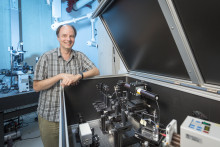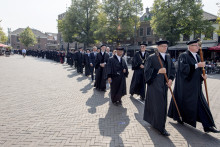Dear Executive Board members, are you still proud of our Science & Technology faculty?
And of the people who accomplish – year after year – top quality education in the natural sciences and engineering? And of the students who strive to master the – generally seen as very demanding, but also very much wanted by society – subjects covered in S&T? And of all the support staff who perform difficult and highly varied tasks in a complex scientific and technical environment?
Why then does S&T feels to be standing alone in trying to solve its present deficit? Why is there no apparent, jointly felt responsibility? Why does there seem to be no incentive to look back critically at decisions made in earlier and more generous years that have led to the current much stronger impact of deteriorating finances for S&T?
It is no secret that the UT has a deficit. And that is not something unique amongst the Dutch universities. Highly risen salaries and costs for purchases and maintenance – all due to inflation – and heavily increased energy costs, all without proper compensation by the government, are to blame for a large extent. It is also no secret that half of the total UT deficit lies within S&T.
But the question is whether that is a fair assessment. My postulate is that S&T has been underfinanced for many years already and that decisions made in recent years have contributed to the now witnessed steep decline in the financial well-being of the faculty. And be assured, with such a decline of the financial well-being comes an inevitable decline of S&T people’s well-being, caused by uncertainty, stress, and feelings of being unheard and standing alone.
The topics of Science & Technology – physics, chemistry, biomedical and health sciences, materials science, nanotechnology – are not only challenging; they require students and staff to be trained with the latest technology. We cannot expect our students to take the lead in solving society’s challenges in sustainability, green energy and societally relevant healthcare when we do not equip them with the proper tools. Alas, some of these tools are expensive, students require more than books, and much of our education is built on staff and time-intensive courses like practicals. But, society asks this from us! All of our graduates get a job easily, and many within our region, both Dutch nationals and internationals alike. Many companies hire our graduates, and need even more than we can deliver.
Together with proper education comes proper research. Our topics require staff to be working at the scientific forefront. This is the very essence of our academic education: being trained by active professionals! Likewise, our research is labour, time and resource-intensive. But it is a package deal! You cannot get the high quality education without the tools, nor without the research. As a consequence, we have rather high building costs per staff, rather high staff-to-student ratios, rather expensive equipment that needs, also rather costly, replacement and maintenance. But again, it is a package deal, all or nothing! Yet, we are – still very much so! – a technical university, with a stronghold in the engineering disciplines. If we all feel that, then we need to act on it!
Various changes over the years have structurally underappreciated the essentials sketched above. Can one expect that general UT cost models are valid for all of our education? No, some programmes simply have more costs and need more people to provide a comparable quality. Can one keep taking money out of faculty budgets for centralized facilities (like strategy, purchase, IT, and graduate school) without compensating the faculties and without overseeing the consequences for different faculties? No, at some point, these centralizations go at the expense of the healthy running of a faculty, now first visible at S&T. All these differences and changes of rules and budgets cannot be put in easy numbers. They require vision and guts. And when is vision and guts needed more than ever? In difficult times like these.
So, dear Executive Board members, I ask you again: are you proud of Science & Technology? Then show it!
Jurriaan Huskens
Professor of Supramolecular Chemistry & Nanofabrication, faculty S&T







